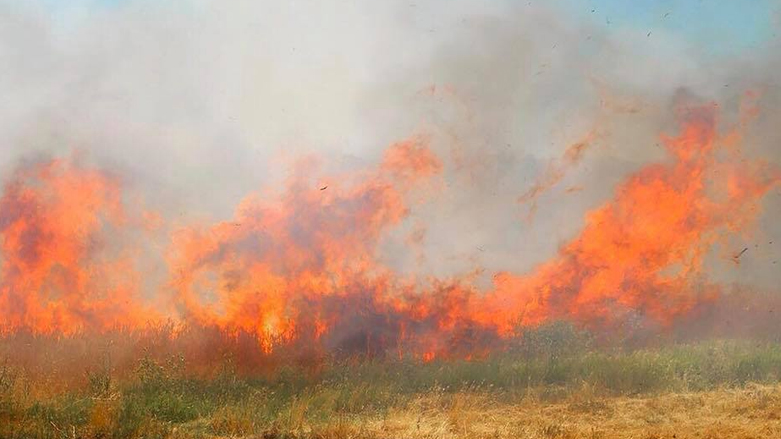Iran to sue Iraq if marshland fires deliberate, Baghdad calls for int'l aid with crisis

ERBIL (Kurdistan 24) – A senior Iranian official threatened to take legal action against Iraq if documents are obtained proving deliberate the fires that swept across Hawizeh Marshes which straddle the two countries’ borders in the southern region.
According to Iranian media outlet ISNA, Vahid Haji Ali-Khani, the deputy director of the Ministry of Foreign Affairs’ office in Khuzestan, made the remarks during a meeting on Sunday at the province’s Crisis Management Headquarters.
Khuzestan is a province that borders Iran and has a part of the Mesopotamian marshes in it. Cities in the area were drowned in the fire’s rising smoke prompting the shutdown of governmental offices.
“Regarding the fire of the Hawizeh Marshes, various remarks have been made to the Iraqi embassy in Tehran and our country’s embassy in Iraq,” Ali-Khani had highlighted during the meeting about the fire and the environmental problems caused by it for citizens in some cities of Khuzestan.
“If the fires are found to have been deliberate, and there is documentation [proving this],” then Ali-Khani’s office will coordinate with the Ministry of Foreign Affairs which will “sue Iraq.”
Ali-Khani added that the Iranian ambassador and consuls to the country are currently pursuing the issue.
In a statement by the office of Ministry of Water Resources (MWR) on Monday, Iraq called on the international community for aid with the blaze that has engulfed the area, Xinhua reported.
The Mesopotamian Marshlands called the Garden of Eden by some, are one of the victims of Saddam Hussein’s reign. In a 15-year-long operation of “ecological vandalism” starting from 1985, he reduced the size of the marshes from the Iraqi side to 10 percent of its volume from 20,000 square-kilometers by draining it, The Economist reported two years after the fall of the dictator in 2003.
After the fall of the regime, approximately 40-60 percent of the marshes have been restored with the aid of international efforts, Wetlands reported in 2016.
However, the sweltering summer heat started a fire that consumed the marshes three weeks ago which spread to the neighboring country of Iran, forcing their military to join efforts to extinguish the wildfire, something they managed to accomplish after a week.
But the fire continues to resurface, due to the drying of the marshes, a point the MWR statement addressed.
“The recent fires have appeared in the densely reedy areas of the northern part of the Hawizeh Marshes due to severe water scarcity and low water flows to the Iraqi marshes.”
It added that “the unprecedented high temperature contributed to the spread of the fires, and adversely affected the health status of the local population and biodiversity in the region, with significant air pollution caused by the rising smoke from these fires.”
The Iraqi ministry called on “international agencies and organizations to provide support and relief to the people of these areas, including drinking water, essential foodstuff, and livestock feed to help them overcome the crisis.”
According to a Kurdistan 24 source, the fire that broke out in the vast marshes has affected 160 square-kilometers of agricultural land on the border with Iran.
Editing by Karzan Sulaivany
